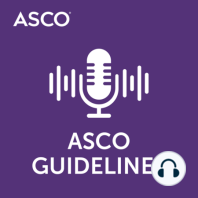15 min listen

Use of Immune Checkpoint Inhibitor Pembrolizumab in the Treatment of High-risk, Early-stage Triple Negative Breast Cancer Rapid Recommendation Update
FromASCO Guidelines
Use of Immune Checkpoint Inhibitor Pembrolizumab in the Treatment of High-risk, Early-stage Triple Negative Breast Cancer Rapid Recommendation Update
FromASCO Guidelines
ratings:
Length:
10 minutes
Released:
Apr 13, 2022
Format:
Podcast episode
Description
An interview with Dr. Lisa Carey from the University of North Carolina Lineberger Comprehensive Cancer Center in Chapel Hill, NC, panel member on “Use of Immune Checkpoint Inhibitor Pembrolizumab in the Treatment of High-risk, Early-stage Triple Negative Breast Cancer: ASCO Guideline Rapid Recommendation Update.” Dr. Carey discusses the updated recommendation on the use of pembrolizumab for patients with T1cN1-2 or T2-4N0 (stage II or III), early-stage triple negative breast cancer. For more information, visit, www.asco.org/breast-cancer-guidelines. TRANSCRIPT Brittany Harvey: Hello and welcome to the ASCO Guidelines Podcast Series brought to you by the ASCO Podcast Network, a collection of nine programs covering a range of educational and scientific content and offering enriching insight into the world of cancer care. You can find all the shows including this one at asco.org/podcasts. My name is Brittany Harvey, and today I'm interviewing Dr. Lisa Carey from the University of North Carolina Lineberger Comprehensive Cancer Center in Chapel Hill, North Carolina, expert panel member on Use of Immune Checkpoint Inhibitor Pembrolizumab in the Treatment of High-risk Early-stage Triple-negative Breast Cancer: ASCO Guideline Rapid Recommendation Update. Thank you for being here, Dr. Carey. Dr. Lisa Carey: It's a pleasure to be here, Brittany. Thank you! Brittany Harvey: Great! First, I like to note that ASCO takes great care in the development of its guidelines and ensures that the ASCO conflict of interest policy is followed for each guideline. The full conflict of interest information for this guideline panel is available online with the publication of the guideline in the Journal of Clinical Oncology. Dr. Carey, do you have any relevant disclosures that are directly related to this guideline topic? Dr. Lisa Carey: I do not. Brittany Harvey: Thank you. Then what prompted this rapid update to the Neoadjuvant Chemotherapy, Endocrine Therapy, and Targeted Therapy for Breast Cancer: ASCO Guideline, which was last published in 2021? Dr. Lisa Carey: You know, what prompted it where there were a number of changes that had come out, particularly things like the use of immune checkpoint inhibitors, and the adoption of the neoadjuvant strategy that really made us feel that these were overdue for practice guidelines. And in particular, there were some very important changes that came out early this year, particularly with the pembrolizumab use. Dr. Brittany Harvey: Great, so, based on these changes in the pembrolizumab use, what is the updated recommendation from the guideline panel? Dr. Lisa Carey: The recommendation actually is for patients who fulfilled the KEYNOTE-522 trial criteria. KEYNOTE-522 was a seminal trial in early triple-negative breast cancer, meaning, treatment-naive of the use of pembrolizumab incorporated into a chemotherapy-based regimen given neoadjuvantly, and then with the continuation of the immune checkpoint inhibitor pembrolizumab adjuvantly. This was important because we had been using, for a couple of years now, immune checkpoint inhibitors in PD-L1 positive or immune-activated triple-negative breast cancers in the metastatic setting. But we had not had evidence of improved survival or outcomes in early triple-negative breast cancer, so that's where KEYNOTE-522 comes in. This was a trial in which patients with early untreated triple-negative breast cancer, who fulfilled at least greater than T1N0, - and I want to make that pretty clear, this is a pretty broad net for early triple-negative breast cancer; the vast majority of triple negatives will be eligible for this treatment based on the population that was studied - and they receive four chemotherapy drugs, so, a taxane plus platinum, followed by an anthracycline-based regimen, either with or without pembrolizumab throughout the entire neoadjuvant course. They then went to surgery, and then they went on to receive adjuvant for another nine cycles, adjuvant pembr
Released:
Apr 13, 2022
Format:
Podcast episode
Titles in the series (100)
Patient-Clinician Communication Consensus Guideline: An interview with Dr. Timothy Gilligan from Taussig Cancer Institute and Institute and the Center for Excellence in Healthcare Communication, Cleveland Clinic, Cleveland, OH on the guideline providing guidance to oncology clinicians on how... by ASCO Guidelines